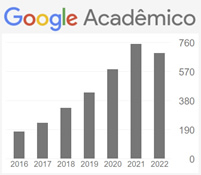Girls “of Life”: Funabem and the “arts of governing” street children and adolescents
DOI:
https://doi.org/10.5965/2175180314362022e0204Keywords:
girl, road, Funabem, social movementsAbstract
At the end of the 1980s, the National Foundation for Minors' Welfare - Funabem published the Meninas da Vida report, which aimed to debate the assistance to street girls. Based on a prescriptive logic, with the objective of circulating nationally, the document provided recommendations for the so-called social educators, who, for the authorship of the report, were the agents responsible for the socio-pedagogical care of these girls. In this context, this article aims to analyze the discourse of the strategies presented for assisting girls in this report, problematizing the concept of “girls of life” and the “arts of governing” street children and adolescents. It is noteworthy that this period was marked by the effervescence of re-democratization, from which emerged the National Movement of Street Boys and Girls, which questioned legislation and policies based on the logic of “minors' welfare”, bringing a pedagogical proposal to recognize these girls as protagonists of their stories. In this way, it is intended to put on screen how the relations between Funabem and the Movement were produced, highlighting, beyond the fissures, how the issue of the girl/woman came to be recognized as a problem of social policy, given that even the At the end of the 1970s, most of the policies produced by the State were marked by the “erasing” of the status of the girl-woman, classifying them generically as “minors”.
Downloads
References
AREND, Silvia Maria Fávero. Trabalho, escola e lazer. In: PINSKY, C.; PEDRO, Joana Maria. Nova História das mulheres no Brasil. São Paulo: Contexto, 2012, p. 63-83.
BRITO, Eleonora. Justiça e Gênero: uma história da Justiça de Menores em Brasília (1960-1990). Brasília: Editora da Universidade de Brasília, 2007.
BUTLER, Judith. Corpos em aliança e política de ruas: notas para uma teoria performativa de assembleia. Rio de Janeiro: Civilização Brasileira, 2018.
BUTLER, Judith. Problemas de gênero: feminismo e subversão da identidade. Rio de Janeiro: Civilização Brasileira, 2015.
BUTLER, Judith. Quadros de Guerra: quando a vida é passível de luto? Rio de Janeiro: Civilização Brasileira, 2017.
DAMINELLI, Camila Serafim. Uma Fundação para o Brasil jovem: Funabem, Menoridade e Políticas Sociais para infância e juventude no Brasil (1964-1979). 2019. 348 f. Tese (Doutorado em História)– Centro de Ciências Humanas e da Educação, Universidade do Estado de Santa Catarina, Florianópolis, 2019. Disponível em: < https://www.udesc.br/arquivos/faed/id_cpmenu/2551/Camila_Serafim_Daminelli_final_15833439835848_2551.pdf>. Acesso em: 12 nov. 2021.
FOUCAULT, Michel. Em defesa da sociedade. São Paulo: Martins Fontes, 2010.
FRONTANA, Isabel. Crianças e adolescentes nas ruas de São Paulo. São Paulo: Edições Loyola, 1999.
FUNABEM – Fundação Nacional de Bem-Estar do Menor. Meninas da Vida. Rio de Janeiro: Funabem, 1989.
GRACIANI, Maria Stela. Pedagogia Social de Rua. São Paulo: Cortez, 2009.
GREGORI, Maria Filomena. Viração: experiências de meninos de rua. São Paulo: Companhia das Letras, 2000.
LAVINAS, Lena. Gênero, cidadania e adolescência. In: MADEIRA, Felícia Reicher (org.). Quem mandou nascer mulher? Rio de Janeiro: Record; Rosa dos Tempos, 1997.
LEITE, Gabriela Silva. Eu, mulher da vida. Rio de Janeiro: Rosa dos Tempos, 1992.
MADEIRA, Felícia Reicher. Quem mandou nascer mulher? Rio de Janeiro: Record; Rosa dos Tempos, 1997.
MIRANDA, Humberto da Silva. Nos tempos das Febems: memórias de infâncias perdidas (Pernambuco/1964–1985). 2014. 348 f. Tese. (Doutorado em História)– Centro de Filosofia e Ciências Humanas, Universidade Federal de Pernambuco. Recife, 2014. Disponível em: < https://repositorio.ufpe.br/handle/123456789/12383>. Acesso em: 12 nov. 2021.
PINSK, Carla Bassanezi; PEDRO, Joana Maria. Igualdade e especificidade. In: PINSK, Carla Bassanezi; PINSK, Jaime. História da cidadania. Rio de Janeiro: Contexto, 2003.
QUADRAT, Samantha Viz. Apresentação. In: QUADRAT, Samantha Viz. Não foi o tempo perdido: os anos 80 em debate. Rio de Janeiro: 7Letras, 2014.
SANTOS, Marco Antonio Cabral dos. Criança e criminalidade no início do século. In: DEL PRIORI, Mary (org.). História das Crianças no Brasil. 6 ed. São Paulo: Contexto, 2009, p. 210-230.
SILVEIRA, Diego Soares. Governamentalidades, saberes e políticas públicas na área de Direitos Humanos da criança e do adolescente. In: RESENDE, Haroldo. Michel Foucault: o governo da infância. Belo Horizonte: Autêntica Editora, 2015, p. 57-83
SOIHET, Rachel. Mulheres pobres e violência no Brasil urbano. In: DEL PRIORE, Mary. História das mulheres no Brasil. São Paulo: Contexto, 2011. P. 362-400
VIANNA, Adriana de Resende. O mal que se adivinha: polícia e menoridade no Rio de Janeiro, 1910-1920. Rio de Janeiro: Arquivo Nacional, 1999.
Downloads
Published
How to Cite
Issue
Section
License
Copyright (c) 2022 Tempo e Argumento

This work is licensed under a Creative Commons Attribution-NonCommercial 4.0 International License.
The articles published by the magazine are for free use, destined for educational purposes and not commercial. The copyrights are all granted to the magazine. The articles whose authors are identified represent the expressed opinion of its authors and not the official position of the Tempo e Argumento magazine or of the Postgraduate Program in History of the Universidade do Estado de Santa Catarina.




